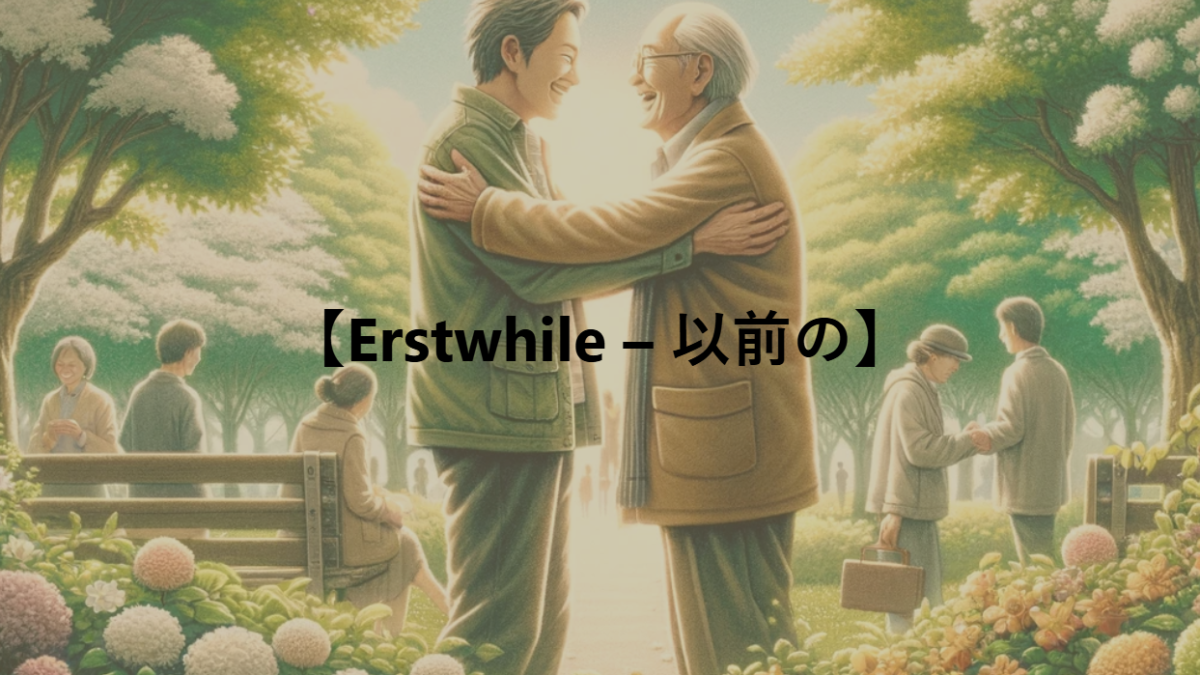語源・類義語・反対語・例文
【Erstwhile – 以前の】という単語の語源とか由来を知っていますか?
「Erstwhile」は、英語の古い形容詞や副詞で、主に「以前の」「かつての」という意味で使われます。この単語は、古英語の「ærst」(早く、すぐに)という副詞と、「hwīl」(時間、期間)という名詞が組み合わさってできた表現です。直訳すると「かつての時」という意味になり、時間の経過を示す言葉として用いられるようになりました。
「ærst」は、「early」(早い)と関連があり、「hwīl」は「while」(間、期間)と関連があります。これらの語源から、「Erstwhile」は時間的な距離や過去に存在した事柄を指し示すのに適した語となりました。
20世紀に入ると、「Erstwhile」は特に文学的な文脈や、過去の事柄や状態を懐かしむ際に用いられる表現として英語で使用されるようになりました。この単語は、過去とのつながりや変化を強調するために使われ、しばしば情緒的なニュアンスを含んでいます。
“Erstwhile” is an old adjective or adverb in English, primarily used to mean “former” or “formerly.” This word is a compound expression formed from the Old English adverb “ærst” (soon, immediately) and the noun “hwīl” (time, period). Translated directly, it means “time past,” and it has come to be used as a term indicating the passage of time.
“ærst” is related to “early,” and “hwīl” is related to “while.” From these etymological roots, “Erstwhile” has become a word suited for indicating temporal distance or matters that existed in the past.
Entering the 20th century, “Erstwhile” began to be used in English particularly in literary contexts or when reminiscing about past events or states. This word is employed to emphasize connections with or changes from the past and often carries emotional nuances.
この単語の類義語・反対語を教えてください。
類義語
- Former – 以前の、前の。ある時点や状況より前にあったものを指します。
- Previous – 前の、以前の。直接的に前に来たものや状態を示します。
- Past – 過去の。時間的に過去に位置するものを指します。
- Old – 古い。時間が経過したことによる古さや、以前の時代に属するものを指します。
- Bygone – 過ぎ去った。もはや存在しない、過去のものや状態を指します。
反対語
- Current – 現在の。今現在進行形である状況や物事を指します。
- Present – 現在の。現在の時点や状況に存在するものを示します。
- Future – 将来の、未来の。これから訪れる時点や状態を指します。
- Contemporary – 同時代の。現代の、今日の状況や流行に合致するものを指します。
- Upcoming – 今度の、これから来る。近い将来に予定されているものやイベントを指します。
似た単語で間違いやすい単語はありますか?
- Former vs Erstwhile: 「Former」は主に2つ以上のものの中で、先にあったものを指すのに使われます。例えば、2人の大統領を比較する際に「the former president」(前の大統領)と言う場合がこれに該当します。「Erstwhile」はより一般的に「以前はそうだったが、今は違う」という意味で使用され、特定の役割や状態からの変化を示唆します。
- Previous vs Erstwhile: 「Previous」は直接前のものや事象を指す場合に使用され、時間的な連続性に焦点を当てます。「Erstwhile」は過去のある時期や状態を指し示すのに使われ、現在とは異なる状態を強調する点で異なります。
- Past vs Erstwhile: 「Past」は一般的に過去全体を指すのに対し、「Erstwhile」は過去の特定の時点や状況に言及する際に用いられます。「Past」はより広範な時間を示すのに対して、「Erstwhile」は特定の過去の状態や役割に焦点を当てる点で区別されます。
この単語を使った例文をいくつか教えてください。
The erstwhile champion lost his title in the recent boxing match.
(かつてのチャンピオンは最近のボクシング試合でタイトルを失いました。)
She was once the CEO of the company, but now she works as a consultant.
(彼女はかつてその会社のCEOでしたが、現在はコンサルタントとして働いています。)
The erstwhile allies have become bitter enemies in the political arena.
(かつての同盟者は政治の舞台で憎しみを持つ敵になりました。)
The company’s erstwhile success was attributed to its innovative products and strong marketing strategies.
(その企業の以前の成功は、革新的な製品と強力なマーケティング戦略によるものとされています。)
The erstwhile grand mansion now stands in ruins, a reminder of its former glory.
(かつての豪華な邸宅は今や廃墟となり、その昔の栄光を思い起こさせます。)
【Erstwhile – 以前の】のコロケーション
- Erstwhile friend – 以前の友人
- かつて親しかったが、現在はそうでない友人を指します。過去の関係性を強調し、現在との変化を示唆しています。
- Erstwhile colleague – 以前の同僚
- かつて一緒に働いていたが、今は別の道を歩んでいる同僚を指します。職場での変化や人間関係の移り変わりを示しています。
- Erstwhile champion – 以前のチャンピオン
- 過去にチャンピオンの地位にあったが、現在はその地位にない人を指します。スポーツや競技などの分野で使われ、栄光の時を懐かしむ際に用いられます。
- Erstwhile position – 以前の地位
- 過去に保持していたが、今はもう保持していない特定の地位や役職を指します。キャリアの変遷や組織内での役割の変化を示すのに使われます。
- Erstwhile belief – 以前の信念
- かつて持っていたが、今は変化した信念や考え方を指します。個人の成長や価値観の変化を表すのに用いられます。
「Erstwhile」という言葉は、過去の状態や役割を指し示す際に用いられる表現であり、特に過去と現在の間の変化や移行を強調したい場合に効果的です。この単語を含むコロケーションは、かつての友人、同僚、チャンピオン、地位、または信念など、時間の経過に伴い変化した様々な要素を指し示すのに用いられます。
例えば、「Erstwhile friend」(以前の友人)は、かつては親しかったが、現在はそうでない友情を指します。この表現は、人間関係の変遷を示唆し、過去の絆を回顧する際に使用されます。「Erstwhile colleague」(以前の同僚)は、以前は共に働いていたが今は別々の道を歩んでいる同僚を指し、職場での人間関係やキャリアパスの変化を象徴しています。
また、「Erstwhile champion」(以前のチャンピオン)は、過去に栄光を手にしていたが、現在はその地位にいない人物を指し、スポーツや競技の世界で使われることがあります。この言葉は、栄光の時を懐かしみ、過去の成功を讃える際に用いられます。
「Erstwhile position」(以前の地位)や「Erstwhile belief」(以前の信念)といった表現は、個人の社会的地位や信条が時間と共にどのように変化してきたかを示し、個人の成長や価値観の進化を反映しています。
これらのコロケーションを通じて、「Erstwhile」は、過去のある時点での状態や役割からの移行を表現し、人生の変化や成長の物語を語る際に深みと情緒を加えることができることがわかります。
The term “Erstwhile” is used to refer to past states or roles, especially effective when emphasizing the transition or change between the past and the present. Collocations involving this word are utilized to denote various elements that have changed over time, such as former friends, colleagues, champions, positions, or beliefs.
For instance, “Erstwhile friend” refers to a friendship that was close in the past but is not so in the present. This expression is used to suggest the evolution of personal relationships, reminiscing about past bonds. “Erstwhile colleague” points to someone who used to work together but now walks a different path, symbolizing changes in workplace relationships or career paths.
Additionally, “Erstwhile champion” refers to individuals who once achieved glory but are no longer in that position, commonly used in the realm of sports and competition. This term is employed to nostalgically remember moments of glory and celebrate past successes.
Expressions such as “Erstwhile position” or “Erstwhile belief” illustrate how an individual’s social status or convictions have changed over time, reflecting personal growth or the evolution of values.
Through these collocations, it becomes evident that “Erstwhile” can express the transition from a certain past state or role, adding depth and emotion when narrating stories of life changes and growth.
erstwhileを使った文法問題
- The _____ allies found themselves on opposing sides in the new conflict.
- (A) erstwhile’s
- (B) erstwhile
- (C) erstwhiles
- (D) erstwhiling
解答と解説: (B) erstwhile
解説: 空欄には名詞alliesを修飾する形容詞が入ります。erstwhileは「以前の」という意味の形容詞です。erstwhile’sは所有格、erstwhilesは複数形、erstwhilingは存在しない単語です。
- The _____ peaceful village had become a battleground.
- (A) erstwhile’s
- (B) erstwhile
- (C) erstwhiles
- (D) erstwhiling
解答と解説: (B) erstwhile
解説: 空欄には名詞villageを修飾する形容詞が入ります。erstwhileは「以前の」という意味の形容詞です。erstwhile’sは所有格、erstwhilesは複数形、erstwhilingは存在しない単語です。
- The company’s _____ success was now a distant memory.
- (A) erstwhile’s
- (B) erstwhile
- (C) erstwhiles
- (D) erstwhiling
解答と解説: (B) erstwhile
解説: 空欄には名詞successを修飾する形容詞が入ります。erstwhileは「以前の」という意味の形容詞です。erstwhile’sは所有格、erstwhilesは複数形、erstwhilingは存在しない単語です。
- The _____ friends had a falling out and hadn’t spoken in years.
- (A) erstwhile’s
- (B) erstwhile
- (C) erstwhiles
- (D) erstwhiling
解答と解説: (B) erstwhile
解説: 空欄には名詞friendsを修飾する形容詞が入ります。erstwhileは「以前の」という意味の形容詞です。erstwhile’sは所有格、erstwhilesは複数形、erstwhilingは存在しない単語です。
- The _____ champion was defeated in the first round of the tournament.
- (A) erstwhile’s
- (B) erstwhile
- (C) erstwhiles
- (D) erstwhiling
解答と解説: (B) erstwhile
解説: 空欄には名詞championを修飾する形容詞が入ります。erstwhileは「以前の」という意味の形容詞です。erstwhile’sは所有格、erstwhilesは複数形、erstwhilingは存在しない単語です。

